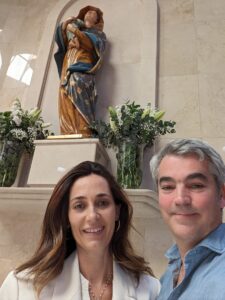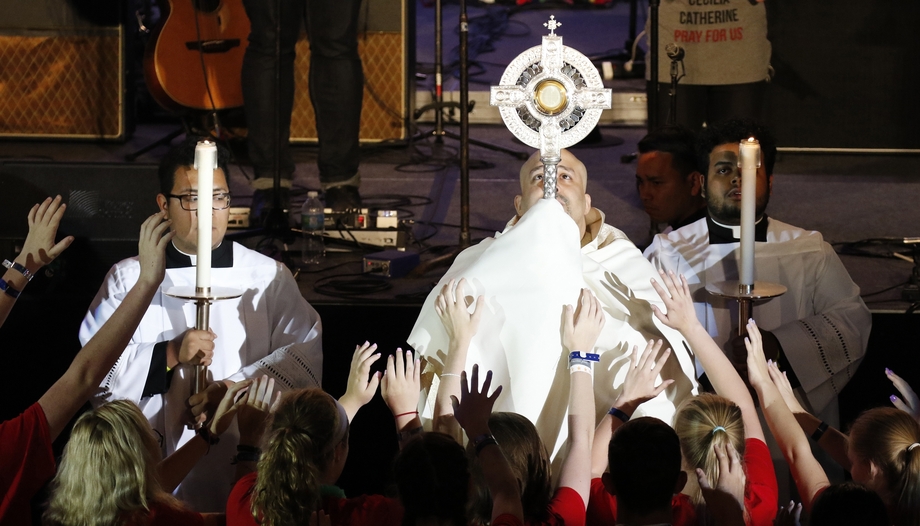The web Withdrawal (www.deretiro.es) is the first search engine for retreats and parish activities in Spain, and currently has about 100,000 visits per year. Behind this portal is a married couple who have been married for more than twenty years, Patricia and Santiago, who define the project to Omnes explaining that "The website 'De retiro' is an aggregator of Catholic information on retreats and activities in the parishes, dioceses and movements of the Catholic Church in Spain. It provides the public with information and contact details so that everyone can directly contact the parish/movement that organizes it.".
Retreats in times of pandemic
During the confinement, many people began to consider attending retreats and finding meaning in what they were experiencing and in their faith. As Patricia and Santiago themselves point out to Omnes, the website Withdrawal "It was born as a result of the covid, people were asking for retreats in the chat rooms and the difficult situations that were experienced made people thirsty for God. This is how it came about, to make known the wide and varied tools that the Catholic Church in Spain has to bring people closer to God and make them available to people, both those who have no faith and those who have numb faith, so that they could find in one place the answer to their concerns. And thus bring together all the information, reducing the existing dispersion of information.".

In response to this initiative, we asked ourselves what has been the response from Internet users, to which the founders of the website responded that "there has been a great demand for information from people, both on Instagram and on the website. We noticed, with the visits on the website and on Instagram, the interest there really is in learning about and signing up for retreats and activities.".
Various projects
Retreats and activities offered Withdrawal are very varied, not only in modality but also in the profile of the people at whom each initiative is aimed. "In general terms"Patricia and Santiago point out, "there is information on retreats and activities segmented by age, from post-communion to senior citizens, including young people, university students, professionals, adults, engaged couples, married couples... Each one can identify with an age group or spiritual need.".
What has been getting the most interest lately, "viewing web statistics", say the founders, "are the Emmaus retreats, Bartimaeus, Ephpheta and the Married Love project, together with the Alpha Dinners.".
The first, Emmaus retreats, are an initiative that emerged in the United States, although it is already widespread in Europe and Spain. They are retreats organized by lay people. It lasts a weekend and can be done only once in a lifetime. The Bartimaeus retreats, which we will talk about later, are aimed at young people, while Effetá is defined on its website as "....a Catholic youth retreat for young people whose purpose is to live a personal encounter with God. It is a testimonial and experiential retreat, organized by young people who have come to know God and want to bring him to others.".
Teenagers and young adults
In more detail, analyzing each age group, Patricia and Santiago indicate that the Bartimaeus retreats and the catechesis of Lifeteen y Edge. This is not surprising, since Lifeteena method of catechesis for adolescents that originated in the United States, is having a great success among young people, since it combines Christian formation with games, dramatizations, activities and different dynamics. The Bartimaeus retreats, created by lay people from the Getafe diocese based on the Emmaus and Ephpheta retreats, are also on the rise and are aimed specifically at young people between the ages of sixteen and seventeen; Among university students and young professionals, the Hakuna, Effetá and Yios retreats (a Regnum Christi initiative that deepens the catechesis on the theology of the body of St. John Paul II), as well as the Hakuna Holy Hours and the Alpha Suppers, are attracting special interest.a series of ten free dinners per week"as indicated in the web site WithdrawalThese dinners, where people who are not in the Church but are curious about the Christian faith can discuss and chat with Christians. Millions of people have already participated in these dinners, which are held in 169 countries around the world. At these dinners, "a debate on faith is opened in which you can freely ask any questions you may have about it, in an open and relaxed atmosphere.", he points out Withdrawal.
Retreats for engaged and married couples
For engaged couples and married couples, Patricia and Santiago point out that there is now a trend to attend the Proyecto Amor Conyugal (PAC), the premarital master's program for engaged couples and the Pit Stop for married couples of Hakuna, the Fortalecimiento Matrimonial de Schoenstatt and projects Filoifor brides and grooms, and Sponsusfor weddings, of Regnum Christi.
The Married Love Project began in Malaga in 2002, but has now spread to many dioceses in Spain. It is based on St. John Paul II's theology of the body catechesis and lasts a weekend. "It consists of working on three pillars (faith, formation and life) to recover God's plan for marriage and the family, which began with the creation of man-woman and aims at holiness.", they explain in Withdrawal.
Adults and senior citizens
Among adults, the web statistics reveal a special interest in the Emmaus retreats, the Cursillos of Christianity, the Ignatian Exercises in silence, the Hakuna Senior project and the Life in the Spirit Seminars. Also noteworthy in this age group are the Schoenstatt and Hakuna formation activities, prayers of praise, Hakuna Holy Hours, Alpha Dinners, mothers' prayer initiatives, Ascending Life groups for the elderly and Communion and Liberation activities, among others.
"People are looking for God."
A project like this always involves some challenges, but also very gratifying moments and fruits. According to Patricia and Santiago, "What we are finding more difficult is to obtain data, since they are disaggregated and there is no database of all of them. And the most beautiful thing is to see how people are looking for God, many times the first time they set foot in a church in years is to sign up for a retreat that they have previously seen on the web.".







